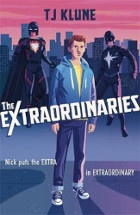The Extraordinaries by T.J. Klune

Hachette, 2020. ISBN: 9781473693050.
(Age: Adolescent - Adult) This is a story about ordinary people who
can sometimes be extraordinary, inhabiting a world that, for them,
is different. They have powers of observation, movement,
understanding and power that enable them to move in space, to
create situations in which different things can happen. They can be
outside of the world that we normally inhabit, and act in a capacity
that may save people from disaster. While focusing on adolescence,
this narrative is very much about the real world of today, a world
that is somewhat fraught with anxiety, and one in which it is still
important to love and find love, to spend time with family and
friends, and to seek to understand those close to us, as well as the
outside world.
Essentially this story has an 'added reality' that reflects that
which used to be called 'science fiction'. The powers possessed by
the Extraordinaries are much envied by their peers, while actually
often causing the Extraordinaries to experience emotional angst that
causes them to suffer. The narrative takes place in a country that
reflects much of the modern world, that raises issues pertinent to
this current world and that highlights the emotional world of
adolescence, particularly that of the 'queer' world of the text,
that controversial issue of sexual preference for one's own gender.
The protagonist is yearning for love, and is lonely because of his
situation, the loss of his mother, and living with a father who is
yearning for his wife, and desperate to love and care for his son.
Yet the father's job often keeps him at work late and the boy is
left alone, at home.
At its heart, this narrative reflects the issues of adolescents in
the world of today, that of planning a future in a world that often
appears to be unstable to the young, and of a world in which they
are hoping to find a place or a group to which they belong, and to find
a pathway that will be fulfilling. This is essentially a story about
love, particularly in families where it is sometimes forgotten. It
is about the compassion felt for those who struggle for whatever
reason. Klune subtly suggests that we consider 'difference' as
something that exists, that we strive to continue to love and
support those people in our own worlds, offering loving and
compassionate understanding. The novel is suitable for both adult
and adolescent readers.
Elizabeth Bondar